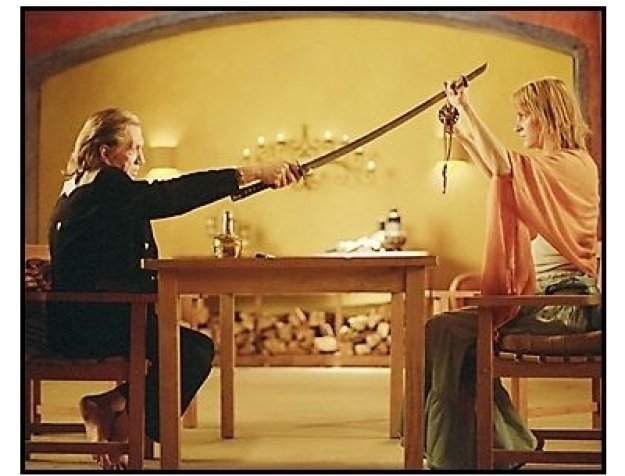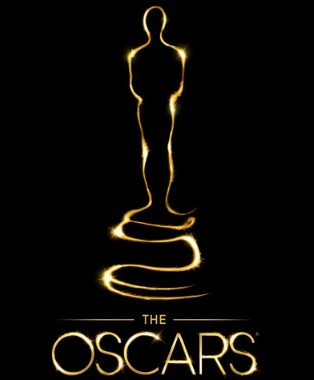
Director: Quentin Tarantino, 2004 (R)
The second chapter of the Kill Bill violent extravaganza opens with a fake shot of the Bride (Uma Thurman) driving, like the old Hitchcock car ride scenes. And the Bride sets the scene with a quick recap of volume 1:
Looked dead, didn't I? But I wasn't. But it wasn't from lack of trying, I can tell you that. Actually, Bill's last bullet put me in a coma. A coma I was to lie in for four years. When I woke up, I went on what the movie advertisements refer to as a 'roaring rampage of revenge.' I roared. And I rampaged. And I got bloody satisfaction. I've killed a hell of a lot of people to get to this point, but I have only one more. The last one. The one I'm driving to right now. The only one left. And when I arrive at my destination, I am gonna kill Bill.Like its predecessor, volume 2 plays with the timing of scenes, so actually when this film starts there are three vipers left: Elle Driver (Daryl Hannah), Budd (Michael Madsen), and Bill himself (David Carradine). Unlike its predecessor, this revenge film limits the body count to three, as compared to over 40, and focuses more on conversation and character development than non-stop violence. There are several graphic scenes of violence, especially when Elle (also known as California Mountain King Snake) takes on the Bride (also known as the Black Mamba), but none are as severe or sustained as in the first movie (except for one particularly nasty body part removal).
The story plays longer and we see how the Bride became the person she is. We also meet (briefly) the man she would have married. This view of the past brings out the person in the present.
At one point, though, Bill asks Bud: "Can't we just . . . forget the past?" He wants to move on. But we cannot simply forget the past. The past carries the seeds of today and the fruit of tomorrow. Our former choices convey with them consequences, as did those of the Bride and her cadre of assassins. The sins of the past move on into the present, unless they have been paid. When we trust Christ, God does take care of these sins: "as far as the east is from the west, so far has he removed our transgressions from us" (Psa. 103:12). God forgives and forgets, and then we can forget the past, too.
One of the beauties of this film compared to volume 1 is the conversation between Bill and the Bride, and there are several. The last one becomes an extended discourse that shows Bill's true character. Although he comes across as urbane and intelligent, he is fickle, as quick to tell a story or make a sandwich as he is to shoot a friend.
He offers a thought to the Bride from a parable on superman: "Clark Kent is to Superman's critique on the whole human race. Sorta like Beatrix Kiddo and Mrs. Tommy Plimpton" (the latter being two names for the Bride). When she asks him, "Are you calling me a superhero?", he replies, "I'm calling you a killer. A natural born killer. You always have been, and you always will be." To him, her nature cannot be changed. She is who she is, and will never change. This is counter to what she seeks.
This philosophy is also counter to biblical truth. We are born in sin (Psa. 51:5). We bear the corrupt image of Adam, our forefather. But we can be changed. We need not remain trapped in this destiny of destruction. By turning to Christ, we can become reborn (Jn. 3:7), a new creation (2 Cor. 5:17). In him we find ourselves reconciled and remade in the image of the second Adam (1 Cor. 15:45). Hope beckons; change remains a potential.
 Earlier in the film, Elle Driver gives a mini-speech on the black mamba, the Bride's alter ego: "In Africa the saying goes 'In the bush, an elephant can kill you, a leopard can kill you, and a black mamba can kill you. But only with the mamba is death sure.' Hence its handle, 'Death Incarnate.' " The Bride is none other than Death Incarnate.
Earlier in the film, Elle Driver gives a mini-speech on the black mamba, the Bride's alter ego: "In Africa the saying goes 'In the bush, an elephant can kill you, a leopard can kill you, and a black mamba can kill you. But only with the mamba is death sure.' Hence its handle, 'Death Incarnate.' " The Bride is none other than Death Incarnate.The Bride contrasts starkly, in her role as black mamba, with Christ. While she is death incarnate, he is life incarnate. The son of God, Jesus Christ, came to earth as God incarnate, made into the form of humanity, in the flesh (Jn. 1:14). "In him was life, and that life was the light of all mankind" (Jn. 1:4). He is the very essence of life, and he brings life to all who come to him thirsting for it. He is the white mamba who absorbs the very sting of death (1 Cor. 15:56) from the serpent of old (Rev. 20:2).
Copyright ©2014, Martin Baggs









